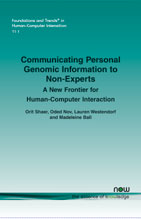Communicating Personal Genomic Information to Non-experts: A New Frontier for Human-Computer Interaction
By Orit Shaer, Wellesley College, USA, oshaer@wellesley.edu | Oded Nov, New York University, USA, onov@nyu.edu | Lauren Westendorf, Wellesley College, USA, lwestend@wellesley.edu | Madeleine Ball, Open Humans Foundation, USA, madeleine@personalgenomes.org
Abstract
Recent advances in genetic testing and Internet technologies have led to a dramatic increase in the access non-experts have to their own personal genomic data. Such data are complex and sensitive, involve multiple dimensions of uncertainty, and can have substantial implications on individuals’ behavior, choices, and well-being. Personal genomic data are also unique because unlike other personal data, which might change frequently, genomic data are largely stable during a person’s lifetime; it is their interpretation and implications that change over time as new medical research exposes relationships between genes and health.
Future progress in genetic research and technologies is likely to further increase the availability of interactive personal genomic information to non-experts. This trend raises technological, ethical, and regulatory concerns related to how people make sense of, engage with, and rely on their personal genomic data. Such concerns are not only of paramount importance for health professionals and policymakers, but are also a pressing issue for human-computer interaction (HCI) research. HCI tools, methods, and practices can help make genomic information more accessible and understandable to non-experts. We argue that the complexity, importance, and personal relevance of this type of information makes understanding, informing, and empowering non-experts’ interaction with personal genomics a key challenge that lies ahead for the HCI community.
In this article, we explore the roles HCI can play in helping nonexperts contribute, understand, engage with, and share their personal genomic information. This article is also a call-to-action for those of us interested in the intersection of personal informatics and HCI, and, more broadly, in facilitating non-expert interaction with large amounts of complex, personal, and uncertain information.
Communicating Personal Genomic Information to Non-experts: A New Frontier for Human-Computer Interaction
Future progress in genetic research and technologies is likely to further increase the availability of interactive personal genomic information to non-experts. This trend raises technological, ethical, and regulatory concerns related to how people make sense of, engage with, and rely on their personal genomic data. Such concerns are not only of paramount importance for health professionals and policy makers, but are also a pressing issue for human-computer interaction (HCI) research. HCI tools, methods and practices can help make genomic information more accessible and understandable to non-experts. This authors make the argument that the complexity, importance, and personal relevance of this type of information makes understanding, informing, and empowering non-experts’ interaction with personal genomics a key challenge that lies ahead for the HCI community.
This monograph explores the roles HCI can play in helping non-experts contribute, understand, engage with, and share their personal genomic information. It is also a call to action for those that are interested in the intersection of personal informatics and HCI, and, more broadly, in facilitating non-expert interaction with large amounts of complex, personal and uncertain information.
